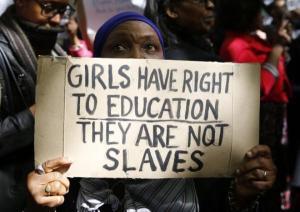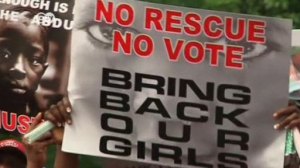I’m feeling some type of way about the abduction of the school girls in Nigeria..Much of what I’ve read from our American newspapers has been sugar-coated and/or the bigger picture left unrevealed..What IF such antics become common place in the world? How would WE feel if it were our children snatched ( & boldly threatened to be sold into slavery) for a so-called cause? What is the real cause behind these abductions? Is it political? Religious? And what are the consequences that could filter world-wide if the Nigerian government negotiates with Boko Haram? I happened upon an article from a Nigerian historian , writer and author that is the best analysis of the entire situation>>
**
Boko Haram: six reasons why the Nigerian militant group is so powerful. Written by Max Siollun
Not long ago, few Nigerians had heard of Boko Haram. Now, the whole world is talking about the extremist group that kidnaps school girls and bombs cities. How did it become so formidable?
Six years ago, most Nigerians had not even heard of Boko Haram. Now the whole world is talking about the extremist group that has kidnapped more than 200 schoolgirls in the north of the country. Founded in 2002, how did it rise to become such a threat to national security in such a short period of time?
1. Political connections
It would be naive to think that this kidnap happened in a vacuum, or that the Boko Haram has no connection to the powers that be in Nigeria’s Game of Thrones-style politics. Spikes in violence and insecurity took place on a suspiciously recurring basis in the 12-18 months preceding Nigerian presidential elections: the next election is scheduled for 2015.
This tends to be the time that politicians allegedly deploy armed militia to harass, intimidate, or even assassinate their rivals.
In 2012, a senior member, Kabiru Sokoto, was found in a state governor’s house after escaping from police captivity. The year before, a Nigerian senator was arrested on suspicion of aiding the group after claims that he telephoned a militant more than 70 times in one month.
The extremist group is also automatically linked to all kidnappings, violence, and assassinations committed in northern Nigeria – even acts of armed banditry and political assassinations are attributed to it, whether the group claims responsibility for them or not, adding to its reputation and aura.
2. Imbalance between north and south
Seemingly disconnected historical events over the past 60-70 years started the slide into poverty and inequality that eventually led to the formation of Boko Haram. Before Nigeria’s independence in 1960, British colonial authorities ruled the north (where most Muslims live) and south of Nigeria (where most Christians live) separately. Western schools started by Christian missionaries flourished in the south, but Muslim leaders were reluctant to allow Christian mission schools to open in the north.
The long-term result is a massive economic and educational imbalance between the north and south which persists today. In many southern states more than 90% of women are literate. The corresponding percentage is below 5% in some states in the far north. Less than 10% of Nigerian university applicants (pdf) come from the 12 Muslim majority states in northern Nigeria (where Boko Haram’s insurgency rages). Boko Haram draws its members from the legions of uneducated, unemployed, poor and disenchanted young northern men.
3. Sharia law
An overlooked catalyst for Boko Haram’s evolution occurred in 2000 when Ahmed Yerima, the governor of Zamfara state in Nigeria’s north-west, extended the jurisdiction of Muslim sharia law to criminal cases, prescribing punishments such as stoning for adultery, amputation for theft and flogging for drinking alcohol. This became a super-charged political issue in the north, as sharia was popular among Muslims who hoped it would lead to a social and moral revival. Eight other states in northern Nigeria also enacted sharia in full and Boko Haram’s then leader, Mohammed Yusuf, anticipated it would also be implemented in his home state of Borno. They became disaffected and increasingly hostile to the government when Borno did not implement sharia in full.
4. Government crackdown
When Boko Haram clashed with police in 2009, the government responded with a military iron fist. Security forces destroyed Boko Haram’s mosque, killed hundreds of its members, and arrested, then summarily executed, its leader Yusuf and his father-in-law. The routing of Yusuf and his followers radicalised Boko Haram even more by eliminating the conciliatory faction within the group, and paving the way for its takeover by its most implacable faction led by Yusuf’s deputy, Abubakar Shekau.
5. Nigeria’s complicated ethnic and religious mix
Sensitive ethno-regional issues make it difficult to fight Boko Haram. A massive elephant in the room is that the vast majority of the army’s fighting troops have historically been recruited from ethnic groups in northern Nigeria. Such ethnic groups include the Kanuri – to which most Boko Haram members belong. Unleashing the army on militants means soldiers may be ordered to commit fratricide against communities they come from, who they are not hostile to, and leaves the army vulnerable to infiltration.
Also, an attack by Nigeria’s president Goodluck Jonathan (a Christian from the south) on a northern Islamic group with unrestrained force in the year before a presidential election, would surely result in lost votes amid accusations of being heavy handed with people of another faith.
6. Military limitations
The Chibok schoolgirls are unlikely to be rescued in a spectacular military raid. The Nigerian army is trained for conventional warfare and peacekeeping operations. Elaborate hostage rescues are not its forte. It is having to make ad hoc adaptations to train cadets to carry out counter-terrorism and counter-insurgency operations.
Military offensives can only buy temporary breathing space for politicians to devise permanent solutions to the problem posed by Boko Haram. Some in the military establishment acknowledge that the military alone cannot eliminate the group. Nigeria’s former chief of defence, staff General Martin Luther Agwai (who commanded the United Nations peacekeeping mission in Darfur), said: “You can never solve any of these problems with military solutions… It is a political issue; it is a social issue; it is an economic issue, and until these issues are addressed, the military can never give you a solution.”
A likely outcome to the current stand-off is that the government will negotiate an unwieldy deal with Boko Haram that will see the girls released in instalments.
This would not be unprecedented as the Nigerian government has a history of paying off or reaching uncomfortable opaque compromises with its opponents. When militants waged an armed insurgency in the oil-producing areas of southern Nigeria to protest against economic exploitation, the government ended it by granting amnesty and cash stipends to the militants in exchange for them giving up violence. This has created a “money and amnesty for guns” precedent. Muslim leaders from northern Nigeria have urged the government to similarly negotiate with Boko Haram and to grant it amnesty. With more money and more guns, the group might become more powerful still.
Max Siollun is a Nigerian historian, writer, and author of the book Oil, Politics and Violence: Nigeria’s Military Coup Culture 1966-1976. Follow him on Twitter @maxsiollun**
>> Hopefully reading all of the above will give a bit of background about the situation..My heartstrings have been pulled since first hearing of this incident..My pen(& thoughts) are my weapon against injustice..A friend(originally from Sierra Leone) locally released a statement to urge “all” to lift our voices regarding this situation. This isn’t just Nigeria’s war on terrorists; it is the world’s fight also!
OFFICIAL STATEMENT
We Raise Our Voices on the
Abduction of School Girls in Nigeria
From: The Ivory Club of Tampa Bay
Martin Williams, President
Our “mission is to educate the public regarding the history and current affairs of African family values through cultural, educational and social activities. We provide educational scholarships and forums to increase understanding between Africa and America.”
The Ivory Club raises its voice in condemning sectarian group, Boko Haram, and the kidnappers of two hundred plus school age girls in Nigeria. We raise our voice demanding the immediate release of these children and their safe return to their families.
We appeal to all other African organizations in the US to raise your voices and be heard, condemning Boko Haram’s atrocities with these young school girls, and call for their immediate safe return.
We raise our voices in prayers with the rest of the world that the families and friends of these innocent children find comfort within themselves, as the rest of the world demand an end to their brutal captivity.
We raise our voices, calling on the Nigerian Government to use its power, and to fully cooperate with other countries that are willing to offer assistance for the safe release of these abducted school girls.
We raise our voices to all who care about the wellbeing of these young girls and support the use of social media as a means to apply pressure and continue to demand the immediate release and return of these young innocent victims to their family and friends.
The Ivory Club, an organization of African Professionals in the Tampa Bay area, encourages all to join forces at protests, marches, demonstrations and other such events to help bring an end to the wicked abduction of these innocent school girls in Nigeria.
We believe very strongly in African family values and family ties, and will raise our voices against any actions that disrupt and cause the breakdown of this cultural trait.
#BringBackOurGirls





question when has america ever gave a damn about 200 missing black women…hell 200 american missing black women…have you ever in your life seen a national search for a missing black woman like the white girls that come up missing on every media outlet…I know I haven’t….So what’s America’s motive behind this….Oil!!! LOL I’ll do a comic on it.
LikeLike
We have a winner! And I’m glad it was you…I think alof of us know, sadly, that our country’s interest in Nigeria isn’t from a stance of compassion..Even now with the abduction of the school girls…No clean hands at the table! Nigeria is by far the most populous country in Africa..We send approx $ 5 billion in private investments and $ 700 million in aid to Nigeria each year..Yep, every year…Also, as you’ve noted, Nigeria is the 5th largest oil exporter to our country..In addition, about a million and a half Nigerians live here in the U.S…..I , for one, just once would like to know our country is lending a helping humanitarian hand; in sincerity. And not because we have financial interests at stake. Just once it would be wonderful to have a nice warm fuzzy feeling about our efforts to people truly in need. Just once! I look forward to your comedic spin on this..So often humor can convey a message when we really feel like crying over the shame of it all
LikeLike
Never expect the devil to show you compassion. Black people in America expecting the U.S to show compassion and do the right thing is like Palestinians expecting Israel to show love…..doesn’t make sense….makes as bout as much sense as 1+1=3
LikeLike
But there is hope for the struggle to end someday…I think it is a generational thing..A sentiment that will have to die out & stop being taught & re-hashed..The great news is from what I’ve seen the generation behind me(millenials) ; are refusing to buy into racist beliefs.
LikeLike